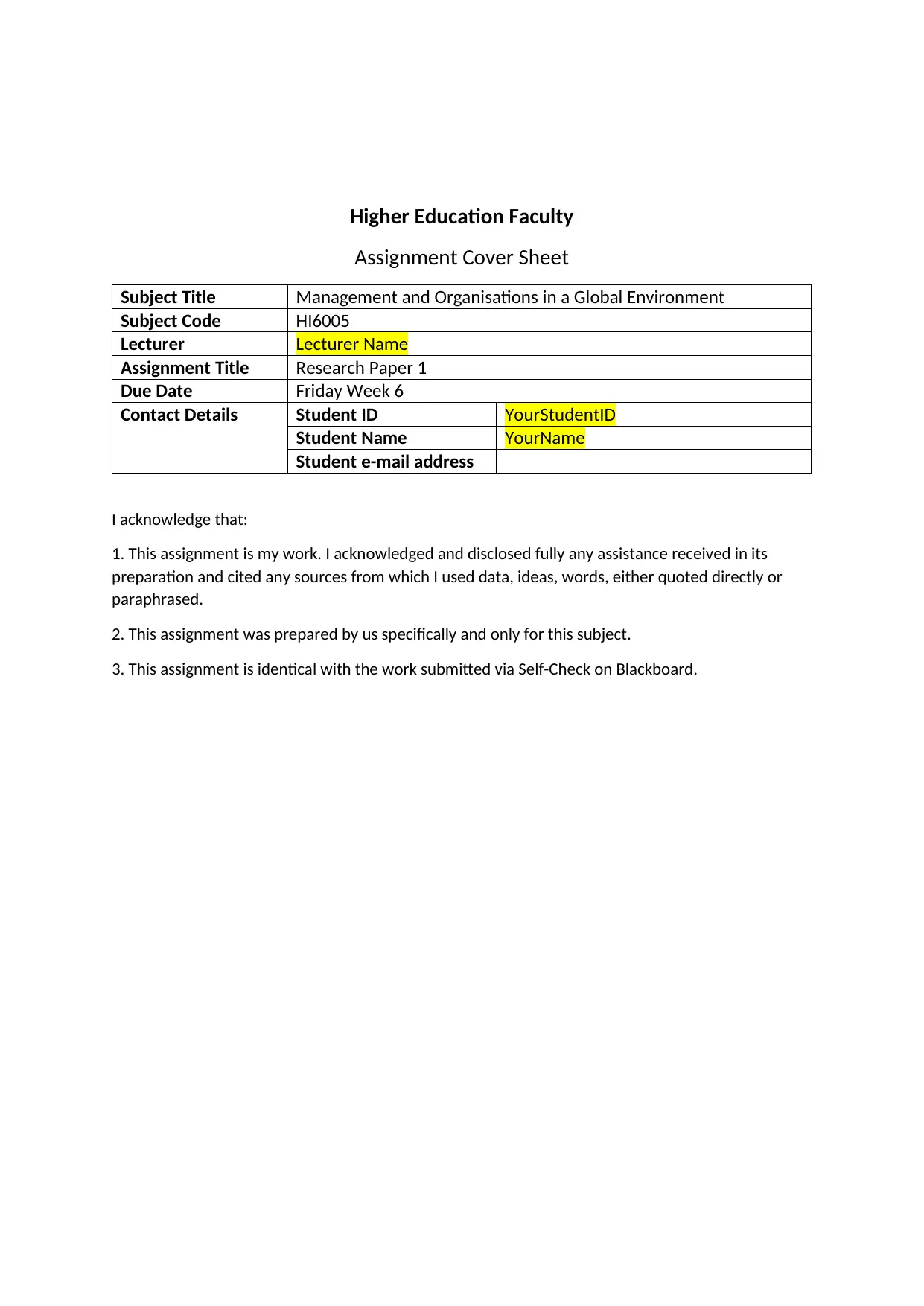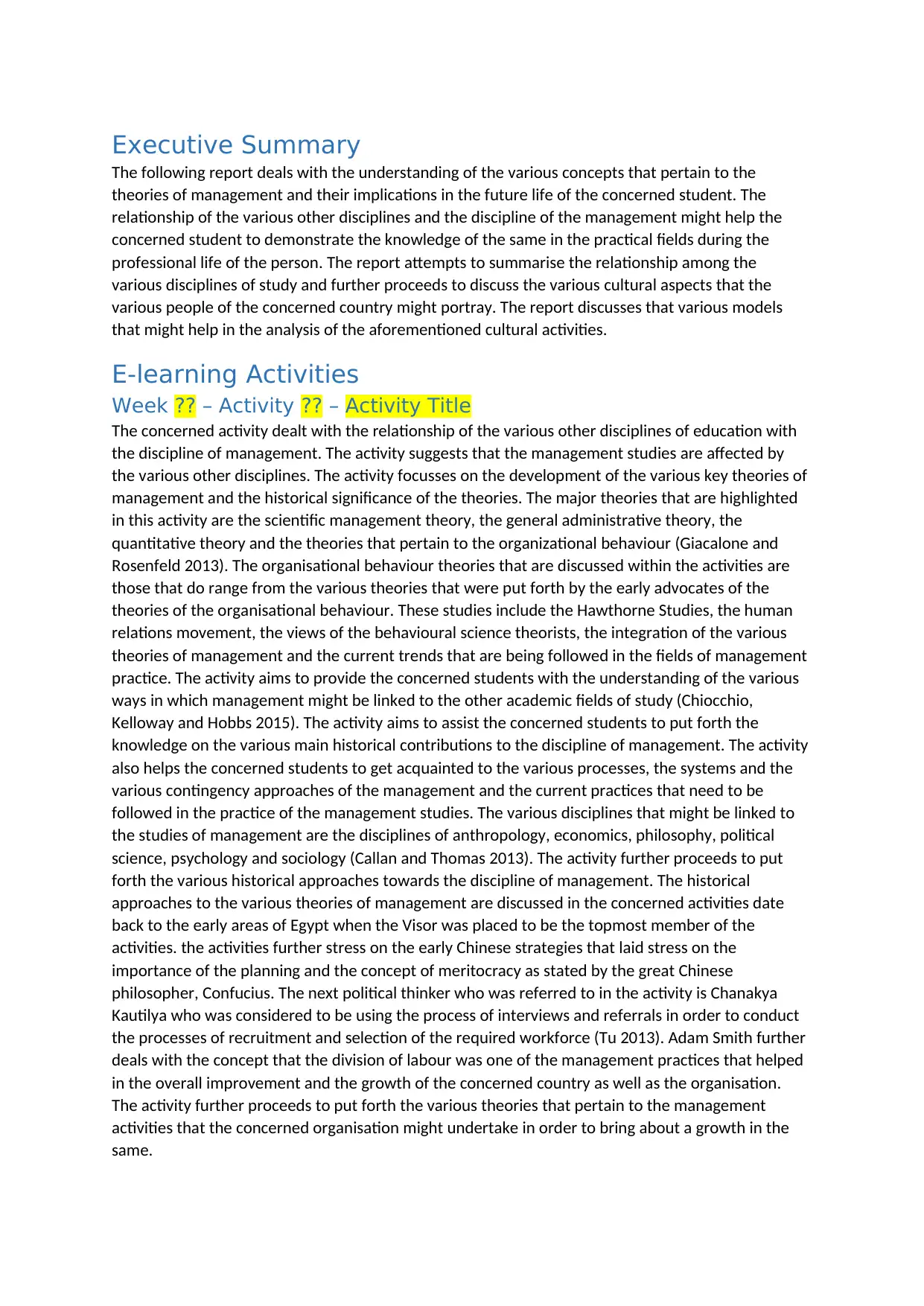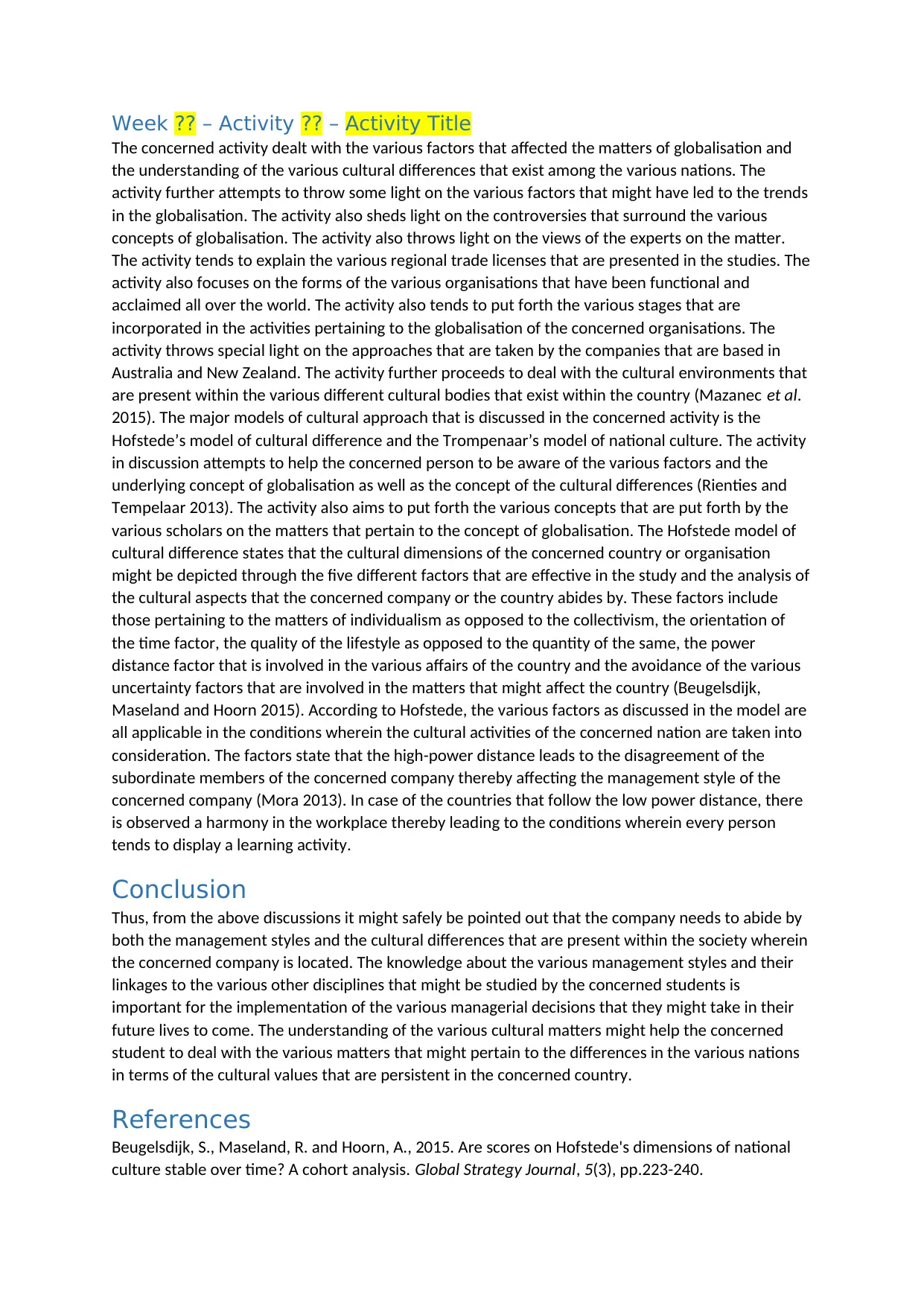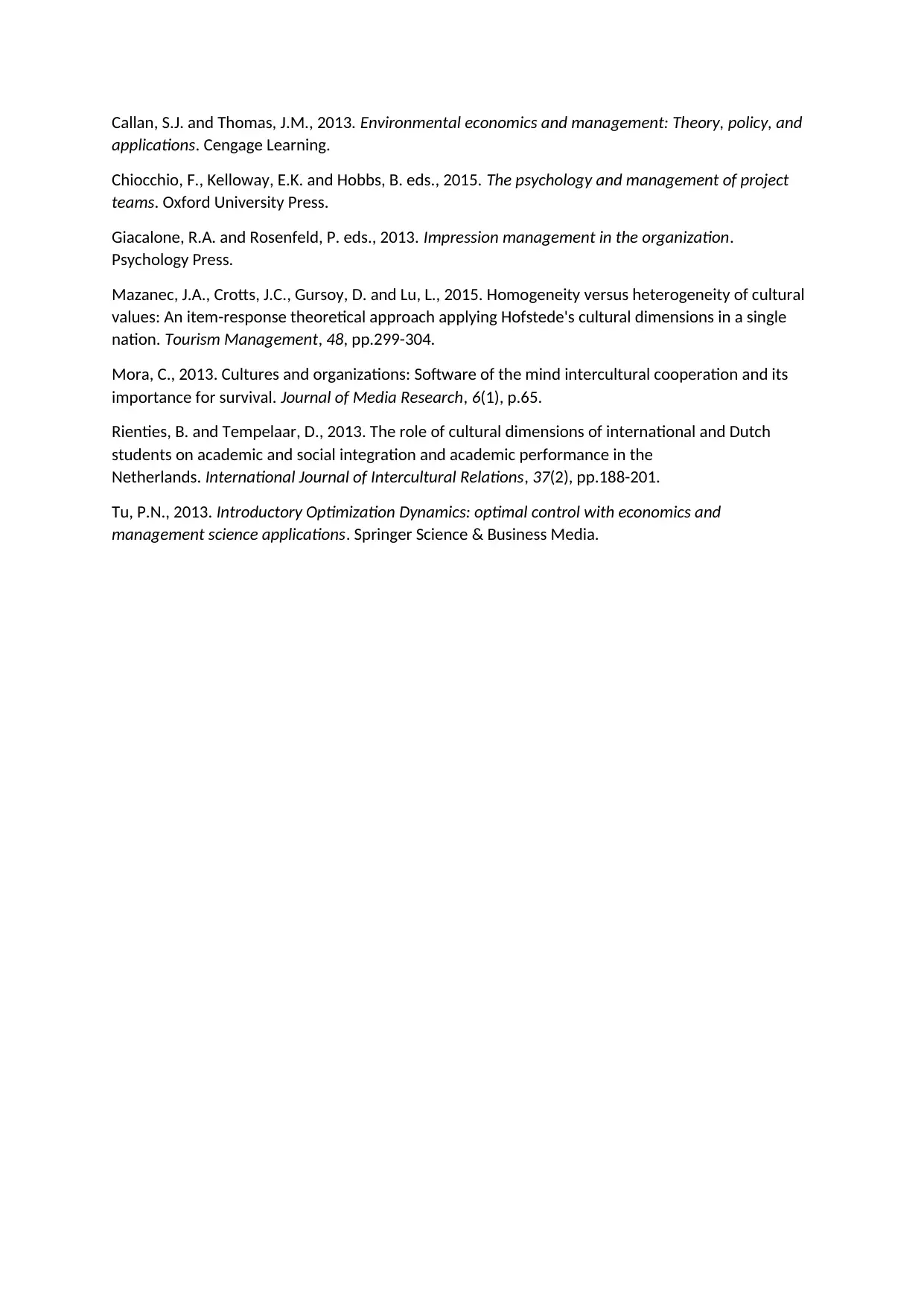HI6005 Research Paper 1: Analysing Management & Globalisation
VerifiedAdded on 2023/06/13
|5
|1736
|213
Report
AI Summary
This report summarises e-learning activities focusing on management theories and globalisation. It explores the relationship between management and other disciplines, highlighting key theories like scientific management, general administrative theory, and organisational behaviour. The report further discusses the impact of globalisation, cultural differences, and models like Hofstede's, analysing their influence on management styles. It concludes by emphasising the importance of understanding both management styles and cultural differences for effective decision-making in a global context, enabling students to apply these concepts in their future professional lives. Desklib provides more resources for students.

Higher Education Faculty
Assignment Cover Sheet
Subject Title Management and Organisations in a Global Environment
Subject Code HI6005
Lecturer Lecturer Name
Assignment Title Research Paper 1
Due Date Friday Week 6
Contact Details Student ID YourStudentID
Student Name YourName
Student e-mail address
I acknowledge that:
1. This assignment is my work. I acknowledged and disclosed fully any assistance received in its
preparation and cited any sources from which I used data, ideas, words, either quoted directly or
paraphrased.
2. This assignment was prepared by us specifically and only for this subject.
3. This assignment is identical with the work submitted via Self-Check on Blackboard.
Assignment Cover Sheet
Subject Title Management and Organisations in a Global Environment
Subject Code HI6005
Lecturer Lecturer Name
Assignment Title Research Paper 1
Due Date Friday Week 6
Contact Details Student ID YourStudentID
Student Name YourName
Student e-mail address
I acknowledge that:
1. This assignment is my work. I acknowledged and disclosed fully any assistance received in its
preparation and cited any sources from which I used data, ideas, words, either quoted directly or
paraphrased.
2. This assignment was prepared by us specifically and only for this subject.
3. This assignment is identical with the work submitted via Self-Check on Blackboard.
Paraphrase This Document
Need a fresh take? Get an instant paraphrase of this document with our AI Paraphraser

Table of Contents
Executive Summary...............................................................................................................................3
E-learning Activities...............................................................................................................................3
Week ?? – Activity ?? – Activity Title.................................................................................................3
Week ?? – Activity ?? – Activity Title.................................................................................................3
Conclusion.............................................................................................................................................3
References.............................................................................................................................................3
Executive Summary...............................................................................................................................3
E-learning Activities...............................................................................................................................3
Week ?? – Activity ?? – Activity Title.................................................................................................3
Week ?? – Activity ?? – Activity Title.................................................................................................3
Conclusion.............................................................................................................................................3
References.............................................................................................................................................3

Executive Summary
The following report deals with the understanding of the various concepts that pertain to the
theories of management and their implications in the future life of the concerned student. The
relationship of the various other disciplines and the discipline of the management might help the
concerned student to demonstrate the knowledge of the same in the practical fields during the
professional life of the person. The report attempts to summarise the relationship among the
various disciplines of study and further proceeds to discuss the various cultural aspects that the
various people of the concerned country might portray. The report discusses that various models
that might help in the analysis of the aforementioned cultural activities.
E-learning Activities
Week ?? – Activity ?? – Activity Title
The concerned activity dealt with the relationship of the various other disciplines of education with
the discipline of management. The activity suggests that the management studies are affected by
the various other disciplines. The activity focusses on the development of the various key theories of
management and the historical significance of the theories. The major theories that are highlighted
in this activity are the scientific management theory, the general administrative theory, the
quantitative theory and the theories that pertain to the organizational behaviour (Giacalone and
Rosenfeld 2013). The organisational behaviour theories that are discussed within the activities are
those that do range from the various theories that were put forth by the early advocates of the
theories of the organisational behaviour. These studies include the Hawthorne Studies, the human
relations movement, the views of the behavioural science theorists, the integration of the various
theories of management and the current trends that are being followed in the fields of management
practice. The activity aims to provide the concerned students with the understanding of the various
ways in which management might be linked to the other academic fields of study (Chiocchio,
Kelloway and Hobbs 2015). The activity aims to assist the concerned students to put forth the
knowledge on the various main historical contributions to the discipline of management. The activity
also helps the concerned students to get acquainted to the various processes, the systems and the
various contingency approaches of the management and the current practices that need to be
followed in the practice of the management studies. The various disciplines that might be linked to
the studies of management are the disciplines of anthropology, economics, philosophy, political
science, psychology and sociology (Callan and Thomas 2013). The activity further proceeds to put
forth the various historical approaches towards the discipline of management. The historical
approaches to the various theories of management are discussed in the concerned activities date
back to the early areas of Egypt when the Visor was placed to be the topmost member of the
activities. the activities further stress on the early Chinese strategies that laid stress on the
importance of the planning and the concept of meritocracy as stated by the great Chinese
philosopher, Confucius. The next political thinker who was referred to in the activity is Chanakya
Kautilya who was considered to be using the process of interviews and referrals in order to conduct
the processes of recruitment and selection of the required workforce (Tu 2013). Adam Smith further
deals with the concept that the division of labour was one of the management practices that helped
in the overall improvement and the growth of the concerned country as well as the organisation.
The activity further proceeds to put forth the various theories that pertain to the management
activities that the concerned organisation might undertake in order to bring about a growth in the
same.
The following report deals with the understanding of the various concepts that pertain to the
theories of management and their implications in the future life of the concerned student. The
relationship of the various other disciplines and the discipline of the management might help the
concerned student to demonstrate the knowledge of the same in the practical fields during the
professional life of the person. The report attempts to summarise the relationship among the
various disciplines of study and further proceeds to discuss the various cultural aspects that the
various people of the concerned country might portray. The report discusses that various models
that might help in the analysis of the aforementioned cultural activities.
E-learning Activities
Week ?? – Activity ?? – Activity Title
The concerned activity dealt with the relationship of the various other disciplines of education with
the discipline of management. The activity suggests that the management studies are affected by
the various other disciplines. The activity focusses on the development of the various key theories of
management and the historical significance of the theories. The major theories that are highlighted
in this activity are the scientific management theory, the general administrative theory, the
quantitative theory and the theories that pertain to the organizational behaviour (Giacalone and
Rosenfeld 2013). The organisational behaviour theories that are discussed within the activities are
those that do range from the various theories that were put forth by the early advocates of the
theories of the organisational behaviour. These studies include the Hawthorne Studies, the human
relations movement, the views of the behavioural science theorists, the integration of the various
theories of management and the current trends that are being followed in the fields of management
practice. The activity aims to provide the concerned students with the understanding of the various
ways in which management might be linked to the other academic fields of study (Chiocchio,
Kelloway and Hobbs 2015). The activity aims to assist the concerned students to put forth the
knowledge on the various main historical contributions to the discipline of management. The activity
also helps the concerned students to get acquainted to the various processes, the systems and the
various contingency approaches of the management and the current practices that need to be
followed in the practice of the management studies. The various disciplines that might be linked to
the studies of management are the disciplines of anthropology, economics, philosophy, political
science, psychology and sociology (Callan and Thomas 2013). The activity further proceeds to put
forth the various historical approaches towards the discipline of management. The historical
approaches to the various theories of management are discussed in the concerned activities date
back to the early areas of Egypt when the Visor was placed to be the topmost member of the
activities. the activities further stress on the early Chinese strategies that laid stress on the
importance of the planning and the concept of meritocracy as stated by the great Chinese
philosopher, Confucius. The next political thinker who was referred to in the activity is Chanakya
Kautilya who was considered to be using the process of interviews and referrals in order to conduct
the processes of recruitment and selection of the required workforce (Tu 2013). Adam Smith further
deals with the concept that the division of labour was one of the management practices that helped
in the overall improvement and the growth of the concerned country as well as the organisation.
The activity further proceeds to put forth the various theories that pertain to the management
activities that the concerned organisation might undertake in order to bring about a growth in the
same.
⊘ This is a preview!⊘
Do you want full access?
Subscribe today to unlock all pages.

Trusted by 1+ million students worldwide

Week ?? – Activity ?? – Activity Title
The concerned activity dealt with the various factors that affected the matters of globalisation and
the understanding of the various cultural differences that exist among the various nations. The
activity further attempts to throw some light on the various factors that might have led to the trends
in the globalisation. The activity also sheds light on the controversies that surround the various
concepts of globalisation. The activity also throws light on the views of the experts on the matter.
The activity tends to explain the various regional trade licenses that are presented in the studies. The
activity also focuses on the forms of the various organisations that have been functional and
acclaimed all over the world. The activity also tends to put forth the various stages that are
incorporated in the activities pertaining to the globalisation of the concerned organisations. The
activity throws special light on the approaches that are taken by the companies that are based in
Australia and New Zealand. The activity further proceeds to deal with the cultural environments that
are present within the various different cultural bodies that exist within the country (Mazanec et al.
2015). The major models of cultural approach that is discussed in the concerned activity is the
Hofstede’s model of cultural difference and the Trompenaar’s model of national culture. The activity
in discussion attempts to help the concerned person to be aware of the various factors and the
underlying concept of globalisation as well as the concept of the cultural differences (Rienties and
Tempelaar 2013). The activity also aims to put forth the various concepts that are put forth by the
various scholars on the matters that pertain to the concept of globalisation. The Hofstede model of
cultural difference states that the cultural dimensions of the concerned country or organisation
might be depicted through the five different factors that are effective in the study and the analysis of
the cultural aspects that the concerned company or the country abides by. These factors include
those pertaining to the matters of individualism as opposed to the collectivism, the orientation of
the time factor, the quality of the lifestyle as opposed to the quantity of the same, the power
distance factor that is involved in the various affairs of the country and the avoidance of the various
uncertainty factors that are involved in the matters that might affect the country (Beugelsdijk,
Maseland and Hoorn 2015). According to Hofstede, the various factors as discussed in the model are
all applicable in the conditions wherein the cultural activities of the concerned nation are taken into
consideration. The factors state that the high-power distance leads to the disagreement of the
subordinate members of the concerned company thereby affecting the management style of the
concerned company (Mora 2013). In case of the countries that follow the low power distance, there
is observed a harmony in the workplace thereby leading to the conditions wherein every person
tends to display a learning activity.
Conclusion
Thus, from the above discussions it might safely be pointed out that the company needs to abide by
both the management styles and the cultural differences that are present within the society wherein
the concerned company is located. The knowledge about the various management styles and their
linkages to the various other disciplines that might be studied by the concerned students is
important for the implementation of the various managerial decisions that they might take in their
future lives to come. The understanding of the various cultural matters might help the concerned
student to deal with the various matters that might pertain to the differences in the various nations
in terms of the cultural values that are persistent in the concerned country.
References
Beugelsdijk, S., Maseland, R. and Hoorn, A., 2015. Are scores on Hofstede's dimensions of national
culture stable over time? A cohort analysis. Global Strategy Journal, 5(3), pp.223-240.
The concerned activity dealt with the various factors that affected the matters of globalisation and
the understanding of the various cultural differences that exist among the various nations. The
activity further attempts to throw some light on the various factors that might have led to the trends
in the globalisation. The activity also sheds light on the controversies that surround the various
concepts of globalisation. The activity also throws light on the views of the experts on the matter.
The activity tends to explain the various regional trade licenses that are presented in the studies. The
activity also focuses on the forms of the various organisations that have been functional and
acclaimed all over the world. The activity also tends to put forth the various stages that are
incorporated in the activities pertaining to the globalisation of the concerned organisations. The
activity throws special light on the approaches that are taken by the companies that are based in
Australia and New Zealand. The activity further proceeds to deal with the cultural environments that
are present within the various different cultural bodies that exist within the country (Mazanec et al.
2015). The major models of cultural approach that is discussed in the concerned activity is the
Hofstede’s model of cultural difference and the Trompenaar’s model of national culture. The activity
in discussion attempts to help the concerned person to be aware of the various factors and the
underlying concept of globalisation as well as the concept of the cultural differences (Rienties and
Tempelaar 2013). The activity also aims to put forth the various concepts that are put forth by the
various scholars on the matters that pertain to the concept of globalisation. The Hofstede model of
cultural difference states that the cultural dimensions of the concerned country or organisation
might be depicted through the five different factors that are effective in the study and the analysis of
the cultural aspects that the concerned company or the country abides by. These factors include
those pertaining to the matters of individualism as opposed to the collectivism, the orientation of
the time factor, the quality of the lifestyle as opposed to the quantity of the same, the power
distance factor that is involved in the various affairs of the country and the avoidance of the various
uncertainty factors that are involved in the matters that might affect the country (Beugelsdijk,
Maseland and Hoorn 2015). According to Hofstede, the various factors as discussed in the model are
all applicable in the conditions wherein the cultural activities of the concerned nation are taken into
consideration. The factors state that the high-power distance leads to the disagreement of the
subordinate members of the concerned company thereby affecting the management style of the
concerned company (Mora 2013). In case of the countries that follow the low power distance, there
is observed a harmony in the workplace thereby leading to the conditions wherein every person
tends to display a learning activity.
Conclusion
Thus, from the above discussions it might safely be pointed out that the company needs to abide by
both the management styles and the cultural differences that are present within the society wherein
the concerned company is located. The knowledge about the various management styles and their
linkages to the various other disciplines that might be studied by the concerned students is
important for the implementation of the various managerial decisions that they might take in their
future lives to come. The understanding of the various cultural matters might help the concerned
student to deal with the various matters that might pertain to the differences in the various nations
in terms of the cultural values that are persistent in the concerned country.
References
Beugelsdijk, S., Maseland, R. and Hoorn, A., 2015. Are scores on Hofstede's dimensions of national
culture stable over time? A cohort analysis. Global Strategy Journal, 5(3), pp.223-240.
Paraphrase This Document
Need a fresh take? Get an instant paraphrase of this document with our AI Paraphraser

Callan, S.J. and Thomas, J.M., 2013. Environmental economics and management: Theory, policy, and
applications. Cengage Learning.
Chiocchio, F., Kelloway, E.K. and Hobbs, B. eds., 2015. The psychology and management of project
teams. Oxford University Press.
Giacalone, R.A. and Rosenfeld, P. eds., 2013. Impression management in the organization.
Psychology Press.
Mazanec, J.A., Crotts, J.C., Gursoy, D. and Lu, L., 2015. Homogeneity versus heterogeneity of cultural
values: An item-response theoretical approach applying Hofstede's cultural dimensions in a single
nation. Tourism Management, 48, pp.299-304.
Mora, C., 2013. Cultures and organizations: Software of the mind intercultural cooperation and its
importance for survival. Journal of Media Research, 6(1), p.65.
Rienties, B. and Tempelaar, D., 2013. The role of cultural dimensions of international and Dutch
students on academic and social integration and academic performance in the
Netherlands. International Journal of Intercultural Relations, 37(2), pp.188-201.
Tu, P.N., 2013. Introductory Optimization Dynamics: optimal control with economics and
management science applications. Springer Science & Business Media.
applications. Cengage Learning.
Chiocchio, F., Kelloway, E.K. and Hobbs, B. eds., 2015. The psychology and management of project
teams. Oxford University Press.
Giacalone, R.A. and Rosenfeld, P. eds., 2013. Impression management in the organization.
Psychology Press.
Mazanec, J.A., Crotts, J.C., Gursoy, D. and Lu, L., 2015. Homogeneity versus heterogeneity of cultural
values: An item-response theoretical approach applying Hofstede's cultural dimensions in a single
nation. Tourism Management, 48, pp.299-304.
Mora, C., 2013. Cultures and organizations: Software of the mind intercultural cooperation and its
importance for survival. Journal of Media Research, 6(1), p.65.
Rienties, B. and Tempelaar, D., 2013. The role of cultural dimensions of international and Dutch
students on academic and social integration and academic performance in the
Netherlands. International Journal of Intercultural Relations, 37(2), pp.188-201.
Tu, P.N., 2013. Introductory Optimization Dynamics: optimal control with economics and
management science applications. Springer Science & Business Media.
1 out of 5
Related Documents
Your All-in-One AI-Powered Toolkit for Academic Success.
+13062052269
info@desklib.com
Available 24*7 on WhatsApp / Email
![[object Object]](/_next/static/media/star-bottom.7253800d.svg)
Unlock your academic potential
Copyright © 2020–2026 A2Z Services. All Rights Reserved. Developed and managed by ZUCOL.





